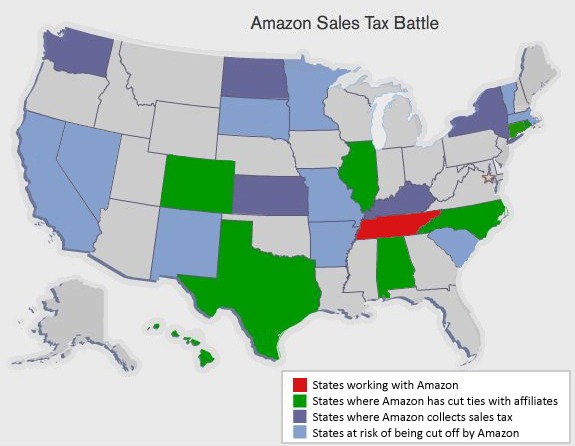The debate regarding the way Amazon.com does its online business has been going on for some time now. The major point of contention has been the fact that for years, Amazon has been able to sell and ship goods across most of the country without charging any state sales tax.
It’s not hard to see why this practice upsets some groups within the states, especially those who protect the interests of brick and mortar stores both large and small. Why would a customer buy a $700 home theater system from a local electronics retailer and pay 6% sales tax (or more) when they can get it shipped to their door free of that state-imposed sales tax via Amazon?
Some states have stepped up and voted to approve new tax laws that require online retailers to collect state sales taxes. Most recently the state of California voted on this issue as part of their new budget.
Here’s how it usually goes – a state decides to enact laws requiring companies like Amazon to collect sales tax. Amazon threatens to sever ties with the affiliates in that state. TheStreet.com has a nice map that shows the current state of the union when it comes to the Amazon tax wars.

The law of the land for a while has said that states cannot force businesses to collect sales tax if it doesn’t have a physical presence within the state. In states like Kentucky, Kansas and New York, Amazon already collects sales tax because those states contain Amazon offices. But no actual Amazon offices equals no sales tax. Amazon’s CEO Jeff Bezos has said that it is protected in the U.S. constitution’s prohibition of state’s interference in interstate commerce –
And in the U.S., the Constitution prohibits states from interfering in interstate commerce. And there was a Supreme Court case decades ago that clarified that businesses — it was mail-order at that time because the Internet did not exist — that mail-order companies could not be required to collect sales tax in states where they didn’t have what’s called “nexus.”
But now, more and more states are saying that Amazon affiliates count as physical presences and are enacting sales tax regulations on the company. Texas is one of those states that is currently in battle with Amazon.
Apparently, Amazon has extended a compromise to the Lone Star State. Amazon proposes that they would spend $300 million in the establishment of distribution centers across the state that would provide over 5,000 jobs to Texans. All they ask in return is to remain exempt from collecting sales tax for the next 4 1/2 years.
They also suggest that Texas’ comptroller sets up a separate website for the collection of voluntary sales tax owed on Amazon purchases. That money would then go directly to the state. It’s highly suspect that many people would choose to pay a sales tax, however.
The current push for online-tax regulation in Texas is part of a pending school finance bill. Governor Rick Perry is unable to line-item veto that online-tax provisions, so he would have to veto the entire school funding bill if he wanted to keep his state online sales tax free.
Texas will certainly not be the last state to debate this issue. What do you think? Should Amazon be forced to collect sales tax? Or does that interfere with interstate commerce laws? Should the federal government step in and mandate a standard online sales tax? Let us know what you think.




 WebProNews is an iEntry Publication
WebProNews is an iEntry Publication